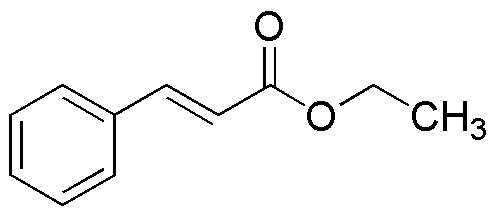Ethyl cinnamate is widely utilized in research focused on:
- Flavoring and Fragrance Industry: This compound is commonly used as a flavoring agent in food products and as a fragrance in perfumes and cosmetics due to its pleasant, sweet, and fruity aroma.
- Pharmaceutical Applications: Ethyl cinnamate has shown potential in drug formulation, particularly in enhancing the solubility and bioavailability of certain medications, making it valuable in pharmaceutical development.
- Natural Product Synthesis: It serves as a key intermediate in the synthesis of various natural products and bioactive compounds, aiding researchers in developing new therapeutic agents.
- Cosmetic Formulations: The compound is used in skincare products for its antioxidant properties, which can help protect the skin from damage caused by free radicals.
- Agricultural Applications: Ethyl cinnamate has been explored for its potential as a natural pesticide and insect repellent, offering an eco-friendly alternative to synthetic chemicals in pest management.
General Information
Properties
Safety and Regulations
Applications
Ethyl cinnamate is widely utilized in research focused on:
- Flavoring and Fragrance Industry: This compound is commonly used as a flavoring agent in food products and as a fragrance in perfumes and cosmetics due to its pleasant, sweet, and fruity aroma.
- Pharmaceutical Applications: Ethyl cinnamate has shown potential in drug formulation, particularly in enhancing the solubility and bioavailability of certain medications, making it valuable in pharmaceutical development.
- Natural Product Synthesis: It serves as a key intermediate in the synthesis of various natural products and bioactive compounds, aiding researchers in developing new therapeutic agents.
- Cosmetic Formulations: The compound is used in skincare products for its antioxidant properties, which can help protect the skin from damage caused by free radicals.
- Agricultural Applications: Ethyl cinnamate has been explored for its potential as a natural pesticide and insect repellent, offering an eco-friendly alternative to synthetic chemicals in pest management.
Documents
Safety Data Sheets (SDS)
The SDS provides comprehensive safety information on handling, storage, and disposal of the product.
Product Specification (PS)
The PS provides a comprehensive breakdown of the product’s properties, including chemical composition, physical state, purity, and storage requirements. It also details acceptable quality ranges and the product's intended applications.
Certificates of Analysis (COA)
Search for Certificates of Analysis (COA) by entering the products Lot Number. Lot and Batch Numbers can be found on a product’s label following the words ‘Lot’ or ‘Batch’.
Número de catálogo
Número de lote/lote
Certificates Of Origin (COO)
This COO confirms the country where the product was manufactured, and also details the materials and components used in it and whether it is derived from natural, synthetic, or other specific sources. This certificate may be required for customs, trade, and regulatory compliance.
Número de catálogo
Número de lote/lote
Safety Data Sheets (SDS)
The SDS provides comprehensive safety information on handling, storage, and disposal of the product.
DownloadProduct Specification (PS)
The PS provides a comprehensive breakdown of the product’s properties, including chemical composition, physical state, purity, and storage requirements. It also details acceptable quality ranges and the product's intended applications.
DownloadCertificates of Analysis (COA)
Search for Certificates of Analysis (COA) by entering the products Lot Number. Lot and Batch Numbers can be found on a product’s label following the words ‘Lot’ or ‘Batch’.
Número de catálogo
Número de lote/lote
Certificates Of Origin (COO)
This COO confirms the country where the product was manufactured, and also details the materials and components used in it and whether it is derived from natural, synthetic, or other specific sources. This certificate may be required for customs, trade, and regulatory compliance.

